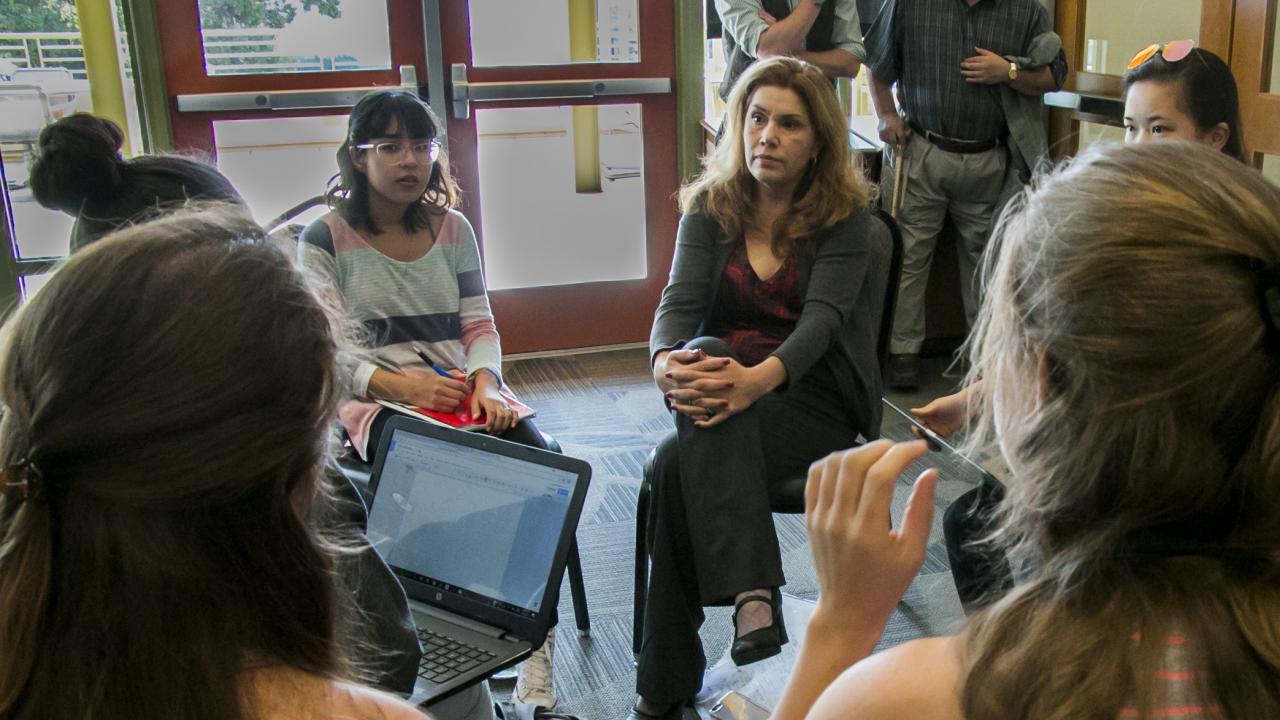
Historian Wins Equity Prize
Associate Professor Lorena Oropeza received the 2017 Equity Award from the American Historical Association last week for excellence in recruiting and retaining historians from underrepresented racial and ethnic groups.
Diversity has long been a challenge in the history profession. According to the AHA, the nation’s largest professional group of historians, African Americans make up 13 percent of the U.S. population, but only 5 percent of all history faculty nationwide; Latinos, who make up roughly 14.5 percent of the population, represent only 3 percent of history faculty. The Equity Award was established in 1996 to promote diversity.
The even lower representation of Chicana historians impressed Oropeza during her doctoral studies at Cornell University in the early 1990s. She heard a talk by Vicki Ruiz, a noted Chicano/a historian who taught at UC Davis from 1985 to 1992 and who is now a distinguished professor at UC Irvine, and had the opportunity to meet her. Ruiz greeted her by saying, “‘Good to meet you. You’re No. 13.’” Oropeza was confused until Ruiz explained: “She said that I was the 13th Mexican American woman in the nation to get a Ph.D. in history,” recalled Oropeza. “That was a few years ago, but there’s not that many of us.”
Inspiring mentor
A UC Davis faculty member since 1996, Oropeza has made an impact by mentoring her graduate students. She meets with these young scholars regularly to share and discuss their research—a group that some of her students have dubbed "Team Lorena" and that Oropeza calls their “mutual sounding board support team.” She believes that preparing students for life with a Ph.D. is essential, especially in a changing economy.
“The best thing about working with Lorena is that she makes it [the study environment] home,” said Genesis Lara, a Ph.D. student and a member of “Team Lorena.” “It’s just such a great feeling to know you always have a support system for you. [She] always believes in you and wants you to be the best that you can, and I think that just makes all the difference.”
“Lorena was the mentor that I was looking for,” said graduate student Griselda Wille. “When I think about what I wanted from graduate school, Lorena is what I imagined, and I latched myself onto her for dear life.”
Second diversity award
The Equity Award, presented Jan. 4, 2018, at the American Historical Society’s Annual meeting in Washington, D.C., comes on the heels of the Chancellor’s Achievement Award for Diversity and Community, which she received in February 2017.
She said she was surprised and honored by both awards, and she admits that she’d rather stay out of the limelight and focus instead on research, teaching, and mentoring.
“To be recognized . . . is really gratifying. I never think of what I do as unusual but evidently some other people did,” she said. “I’m honored by both awards, but I see it as just the work that I do.”
A journalist turned historian
Oropeza’s experiences as a journalist in Arizona and Florida inform her research and remind her of the importance of equity in the field of history. “As a reporter,” she said, “the question was, ‘How do you make the newsroom reflect the city?’ Journalists miss important stories if they don’t have a connection to the whole city and all of its manifestations.
“Who sets up the [historical] archive and what voices are included? If you’re only looking at it from one perspective or if you don’t have a bunch of diverse people in it, you might be missing stuff.”
A more inclusive view of U.S. history
Oropeza has been fascinated by the intersection between race and foreign policy since her days studying American foreign policy in graduate school. Much like news reports, her research uses oral history in addition to available written documents. Oral history taps the memories of people who participated in or witnessed historical events—providing a way to include previously silenced voices. “Oral history is transmitted through memory and time and therefore can be viewed as a little less trustworthy,” she said. “But in some cases, that might be the only source you have. So to me, oral history research is deeply tied to a larger equity project.”
For her, this larger project is integrating Chicano/a history into the broader narrative of American history, particularly in the 1960s. Her forthcoming book, The King of Adobe: Reies López Tijerina, examines the leader of a Chicano resistance movement called the Alianza in New Mexico in the '60s. She describes the Alianza as an anticolonial movement, since its members sought to reclaim the land that had been taken from their ancestors by Americans following the war between the U.S. and Mexico in the 1840s. Race and foreign policy was also the subject of her first book was Raza Sí!, Guerra No! Chicano Protest and Patriotism During the Vietnam War Era, which was published in 2005.
At UC Davis, she regularly teaches “History of the United States” from the Civil War through the Cold War (HIS 17B) and “Mexican American History” (HIS 169A/B), and co-teaches “History of the United States in the Middle East” (HIS 80) with her colleague Baki Tezcan.
— Noah Pflueger-Peters (B.A., English, ’17), writing intern in the UC Davis College of Letters and Science
